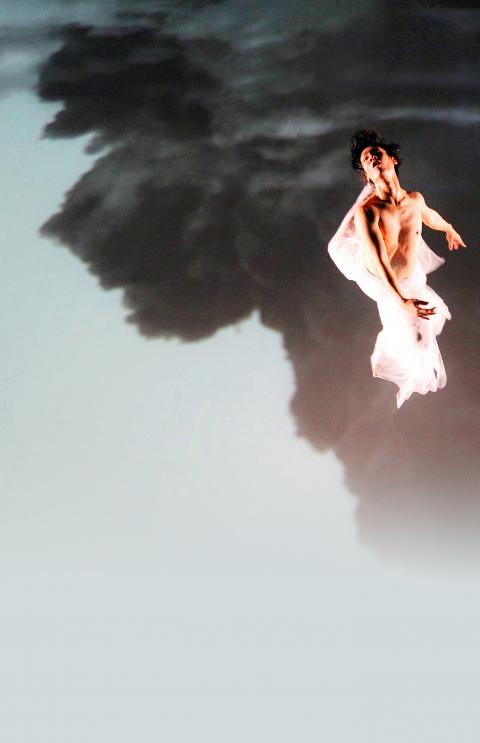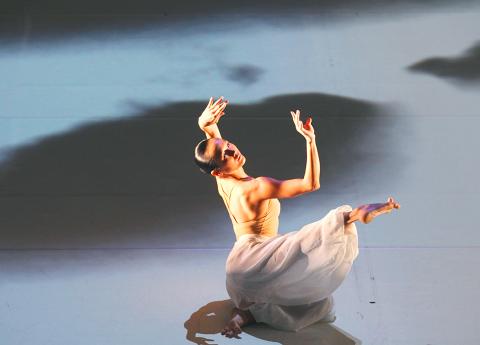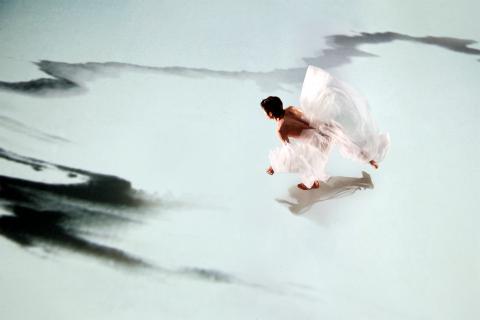The inspiration for Lin Hwai-min’s (林懷民) newest work, Water Stains on the Wall (屋漏痕), came from two of the great loves in his life, Chinese landscape painting and the Tamsui River.
The river, which he can watch from his home in Bali Township (八里), Taipei County, was also the basis for Listening to the River (聽河), the piece Cloud Gate Dance Theatre (雲門舞集) premiered at the National Theater in March as part of the 2010 Taiwan International Festival. It’s been a while since Lin has premiered two new works for his main company in one year. While both were inspired by the river and are meditations on the passage of time, the look and feel of Water Stains is very different from that of Listening.
However, both proved to be challenging for his dancers and technical team.

Photo courtesy of Liu Chen-hsiang
For Listening, Lin commissioned hours and hours of video footage of running water, which then had to be reviewed and edited, while some of his dancers spent hours posing in front of a green screen so their images could be added, for just a few seconds, to the water scenes.
For Water Stains, the dancers perform on a raked set covered with white Marley flooring that looks like rice paper. At a press conference last month, some of the dancers admitted that the rehearsals left them sore. They have always needed amazing physical control for Lin’s spiral-based choreography, but trying to keep their balance while moving across a floor angled at 22° really upped the ante.
Images of drifting clouds, in varying shades of inky blackness, are projected onto the angled floor. Some are mere wisps, while others threaten darkness.

Photo courtesy of Liu Chen-hsiang
“I think the work, whatever I do reflects my love affair with Chinese landscape painting. I always want to do something abstract, but I end up with a landscape painting,” Lin said in a telephone interview last week. “I’m truly affected by this river that I’m looking at now; I just love it. But it’s about work, about time. Water stains are a project of time. There are dancers dancing, images flying.”
So why the raked stage?
“We need it so the audience in the orchestra section can see the projections as well as the dancers. There is just a black background. We’re killing two birds with one stone — there are no overhead lights, just sidelights. Overheads would kill the projections and create thousands of shadows of the dancers,” Lin said.

Photo courtesy of Liu Chen-hsiang
Part of the production’s simplicity was also due to monetary considerations.
“It takes about four hours to lay the Marley and sidelights, so we can save promoters money. Instead of taking three days [to set up the stage], we need only two. The promoters were crying over Wind Shadow (風影) and the set-up time. This will be easier for everyone,” Lin said.
“Water Stains has a very dark part too; there are different degrees of shadows from very light to very dark. It takes off from the story about the calligraphers. I kept it in my heart for a long time, but I just took the story as a title, it really had nothing to do with calligraphy,” Lin said.

Photo courtesy of Liu Chen-hsiang
The story Lin refers to is a famous conversation between two Tang dynasty calligraphers. When Yan Zhenqing (顏真卿) asked Huai Su (懷素), who became renowned for his wild cursive style, what inspired him, Huai said it was watching summer clouds that resemble mountains with spectacular peaks. What about water stains on the wall, Yan asked. To which — according to Cloud Gate’s translation — Huai exclaimed: “Right on!”
The score is by Japanese composer Toshio Hosokawa, who lives in Berlin. Several years ago an agent in Paris who works with both Hosokawa and Cloud Gate sent Lin several of the composer’s CDs. Lin says it always takes years for him to use a certain piece of music; the idea has to accumulate and percolate until the right time and work arrives.
“When I was working on this [Water Stains], I thought ‘Ah ha! That’s it!’ The music has lots of space ... Not all of Hosokawa’s work is like this, many are so, so German, very avant-garde. This one uses traditional Japanese — and therefore Chinese — instruments and was recorded with Japanese musicians,” Lin said.
“Really, truly it is the most simple piece. The lighting is simple, the set is just there,” he said.
While Water Stains will have its world premiere at the National Theater next Friday, the company is performing a classic from its repertoire this week, Songs of the Wanderers (流浪者之歌). However, tickets for all five Taipei shows sold out more than a month ago, which is understandable given that it has been eight years since the company last performed it here. There are still seats for the three shows at the Chiayi Performing Arts Center from Dec. 17 to Dec. 19.
Lin said Songs of the Wanderers occupies a special place in his heart.
“It came from a rare time in my life, I was really quiet, peaceful. I just love it. After I pass, if any of my work is to be preserved, I want it to be this one,” he said.
Set to Georgian folk songs and inspired by Hermann Hesse’s Siddhartha and Lin’s own trip to Boghgaya, India, where Buddha attained enlightenment, the 90-minute Songs of the Wanderers has stunned audiences since its premiere in 1994, especially the 3.5 tonnes of golden rice that trickles and pours from the rafters to cover the stage. The story is about pilgrims in search of peace, and serenity is certainly achieved by the end of the show.
“The choreography is truly not very clever — doing the same thing again and again, but in the end, the simplicity is the best thing,” Lin said. “Like a father tilling his fields, the dancers are tilling a field of rice.”
As usual with Lin’s creations, the prep work is anything but simple. It’s not easy procuring all that golden rice.
“It’s just rice, but no one wants to do it any more. It takes two big guys eight hours a day for a week to dry and dye the rice. At first they are excited, but by the end they don’t want to see us anymore. They always say: ‘It’s wonderful, but don’t call us again,’” Lin said.
Challenges, however, are what Lin thrives on, as much as he might complain that he’s getting to old to do so much.
“I like to be cornered and then come out of it,” he said.
ADDITIONAL PERFORMANCES:
Water Stains on the Wall
Dec. 4 at 7:45pm and Dec. 5 at 2:45pm at Taichung Chungshan Hall (台中市中山堂), 98 Syueshih Rd, Taichung City (台中市學士路98號)
Dec. 11 at 7:45pm and Dec. 12 at 2:45pm at Kaohsiung Cultural Center’s Chih-teh Hall (高雄市文化中心至德堂), 67 Wufu 1st Rd, Kaohsiung City (高雄市五福一路67號)
Admission: NT$300 to NT$1,500
Songs of the Wanderers (流浪者之歌)
Dec. 17 and Dec. 18 at 7:45pm and Dec. 19 at 2:45pm at Chiayi Performing Arts Center (嘉義縣表演藝術中心演藝廳), 265, Jianguo Rd Sec 2, Minsyong Township, Chiayi County (嘉義縣民雄鄉建國路二段265號)
Admission: NT$900 to NT$1,500

June 23 to June 29 After capturing the walled city of Hsinchu on June 22, 1895, the Japanese hoped to quickly push south and seize control of Taiwan’s entire west coast — but their advance was stalled for more than a month. Not only did local Hakka fighters continue to cause them headaches, resistance forces even attempted to retake the city three times. “We had planned to occupy Anping (Tainan) and Takao (Kaohsiung) as soon as possible, but ever since we took Hsinchu, nearby bandits proclaiming to be ‘righteous people’ (義民) have been destroying train tracks and electrical cables, and gathering in villages

Dr. Y. Tony Yang, Associate Dean of Health Policy and Population Science at George Washington University, argued last week in a piece for the Taipei Times about former president Ma Ying-jeou (馬英九) leading a student delegation to the People’s Republic of China (PRC) that, “The real question is not whether Ma’s visit helps or hurts Taiwan — it is why Taiwan lacks a sophisticated, multi-track approach to one of the most complex geopolitical relationships in the world” (“Ma’s Visit, DPP’s Blind Spot,” June 18, page 8). Yang contends that the Democratic Progressive Party (DPP) has a blind spot: “By treating any

This year will go down in the history books. Taiwan faces enormous turmoil and uncertainty in the coming months. Which political parties are in a good position to handle big changes? All of the main parties are beset with challenges. Taking stock, this column examined the Taiwan People’s Party (TPP) (“Huang Kuo-chang’s choking the life out of the TPP,” May 28, page 12), the Democratic Progressive Party (DPP) (“Challenges amid choppy waters for the DPP,” June 14, page 12) and the Chinese Nationalist Party (KMT) (“KMT struggles to seize opportunities as ‘interesting times’ loom,” June 20, page 11). Times like these can

Swooping low over the banks of a Nile River tributary, an aid flight run by retired American military officers released a stream of food-stuffed sacks over a town emptied by fighting in South Sudan, a country wracked by conflict. Last week’s air drop was the latest in a controversial development — private contracting firms led by former US intelligence officers and military veterans delivering aid to some of the world’s deadliest conflict zones, in operations organized with governments that are combatants in the conflicts. The moves are roiling the global aid community, which warns of a more militarized, politicized and profit-seeking trend